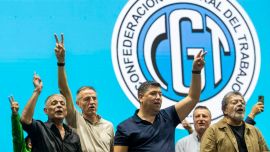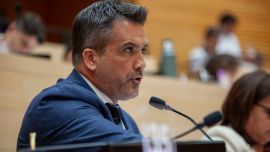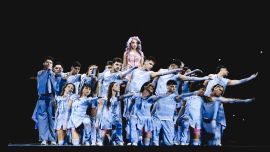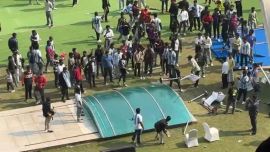Facing the press after a disastrous performance in Sunday night's PASO primaries, an agitated and irritated Mauricio Macri declared his government would take measures to try and stabilise the peso as Argentina's currency and assets took a severe hit.
On Sunday night, the president was dealt a huge blow in his bid for re-election in October when he polled 15 points less than Peronist candidate Alberto Fernández. In the wake of the news, the peso and the Buenos Aires Stock Exchange plunged Monday. Nonetheless, Macri vowed to reporters that his Juntos por el Cambio coalition would turn things around and that he would reach a second round run-off in November.
"We are going to reverse this bad election and we are going to reach the second round," he told reporters defiantly at a press conference at the Casa Rosada.
"Every election is a message and we understand it. We are here to continue working. We are convinced that we have a lot to discuss and do and that the election in October will be a good opportunity to show that the change continues, "said the president.
The president, who spoke with haste and evident frustration, repeatedly sought to put pressure on his Peronist-Kirchnerite opponents, saying it was on the Frente de Todos coalition to calm the markets.
"Kirchnerismo has no credibility in the world," he said, saying the the turbulence in the markets was the result of "what they did before."
"I don't manage the markets, the markets are people who decide [whether] to invest," he emphasised. "I have instructed the economic team to prepare economic measures to take care of the Argentines."
lanked by his Peronist running-mate, Senator Miguel Ángel Pichetto, Macri said that no investor would be interested in Argentina unless Kirchnerite leaders carried out "self-criticism," rebuffing a number of questions about what would happen next.
"Kirchnerismo has to make an extra effort to show that it will do something different [if they win the election]," said Macri, adding that his opponents must not harm Argentines with "exchange instability."
"They have said that they call into question [Argentina's] commitments, the Leliq... I did not say," the president. "This is only a sample of what can happen. The world sees this as the end of Argentina."
However, despite saying that his government was taking steps to calm the markets, Macri had no concrete announcements to offer.
"The president cannot have peace of mind. The markets are giving warning that the government has put itself in a position it cannot respond to," Fernández told Radio 10 on Monday morning, in the wake of the results.
Despite rumours of potential exits from the president's Cabinet, no reshuffle was announced.
Market turbulence
Nervousness reigned Monday morning as the peso opened at 53 to the dollar, a drop of 14 percent from its closing figure of 46.55 on Friday, before plummeting further to 60. And the Merval index crashed 30 percent, too, as markets reacted with jitters to Macri's rout.
The president called a meeting with Central Bank President Guido Sandleris before the markets opened on Monday morning, while putting back his morning cabinet meeting to 3.30pm. The Central Bank bought US$50 million in pesos to try to halt the slide, but to no avail.
Argentina is currently in a recession and posted 22 percent inflation for the first half of the year – one of the highest rates in the world. Poverty now affects 32 percent of the population.
Backed by the International Monetary Fund (IMF), Macri has initiated an austerity plan that is deeply unpopular among ordinary Argentines, who have seen their spending power diminished dramatically. The peso lost half its value against the dollar last year.
The Buenos Aires Stock Exchange had shot up eight percent on Friday amid expectation that Macri would do well in Sunday's vote. Those hopes were quickly quashed as it lost 10 percent when operations opened on Monday, before plunging further during the first two hours of trading. The worst hit shares lost 46 percent of their value.
Daunting task
The president now faces a daunting task of trying to overturn a huge deficit in just two-and-a-half months. Many analysts on Monday wrote off his chances of a comeback, after Macri took 32 percent of the vote, compared to Fernández's 47.66 percent.
"The vote shows a profound dissatisfaction with the economic situation [and] the worry within society that the government is disconnected from reality and wasn't up to tackling the problems," political analyst Carlos Fara told the AFP news agency.
"We've had a bad election and that forces us to redouble our efforts from tomorrow," admitted Macri on Sunday night. "It hurts that we haven't had the support we'd hoped for."
Political analyst Sergio Berensztein described it as the government's "worst political crisis."
Fernández scored 47 percent and if he repeats that result in the October 27 general election first round, he would win outright without need for a November 24 run-off. Argentina's electoral law requires a candidate to gain 45 percent for outright victory, or 40 percent and a lead of at least 10 points over the nearest challenger.
"We're going to begin a new stage. We always fix the problems that others create," Fernández told thousands of cheering supporters in Buenos Aires on Sunday night.
'Very difficult'
Analyst Rosendo Fraga said Macri and Fernandez need to come to a bipartisan "governability agreement," otherwise "it's going to be very difficult to build confidence" in the markets between now and October's vote.
In comments that raise the spectre of another difficult transition between governments in Argentina, Fernández said only Interior Minister Rogelio Frigerio from Juntos por el Cambio had called in the wake of the Peronist coalition's stunning victory.
"[Macri] has not called me in all these years. I don't think he's going to call me now," Fernández said, as he departed the Institutio Patria, after a meeting with his vice-presidential running mate Cristina Fernández de Kirchner and Buenos Aires Province gubernatorial hopeful Axel Kicillof, who stormed to victory in the nation's most-populous district.
– TIMES/AFP/NA






















Comments